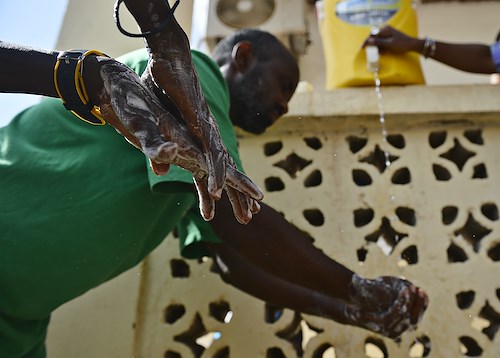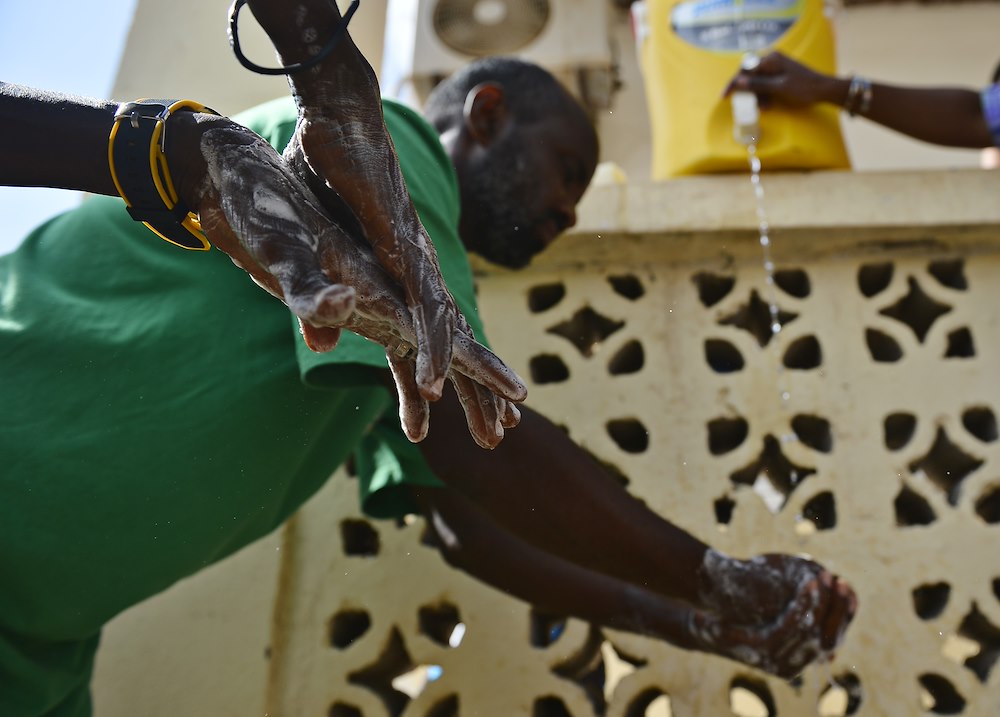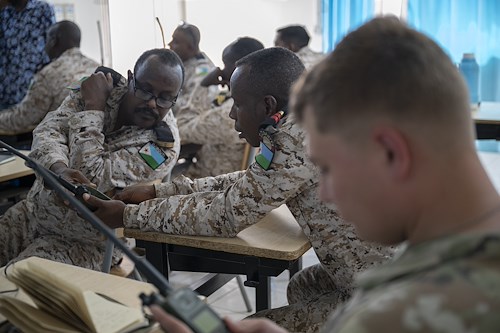Gallery contains 6 images
×
Photo 1 of 6
Combined Joint Task Force - Horn of Africa Image
Obock Regional Hospital employees practice hand washing during a Community Health Worker course in Obock, Djibouti, Oct. 17, 2015. The U.S. Army Civil Affairs Battalion, assigned to Combined Joint Task Force-Horn of Africa, partnered with the U.S. Agency for International Development and Djibouti’s Ministry of Health to share practices with hospital employees on preventative medicine, first aid, oral hygiene care, and the health hazards of female genital mutilation. (U.S. Air Force photo by Senior Airman Nesha Humes)
Photo by: Senior Airman Nesha Humes
Photo 2 of 6
Combined Joint Task Force - Horn of Africa Image
U.S. Army Capt. Serena Staples, Civil Affairs Battalion public health nurse, right, uses a black light and powder to demonstrate germ transfer during a hand hygiene exercise in Obock, Djibouti, Oct. 17, 2015. The U.S. Army Civil Affairs Bn, assigned to Combined Joint Task Force-Horn of Africa, held a community health worker course, where more than a dozen health workers learned basic preventative medicine measures, first aid, oral hygiene care, and the health hazards of female genital mutilation. (U.S. Air Force photo by Senior Airman Nesha Humes)
Photo by: Senior Airman Nesha Humes
Photo 3 of 6
Combined Joint Task Force - Horn of Africa Image
U.S. Army Staff Sgt. Erica Stagg, Civil Affairs Battalion preventive medicine NCO in charge, assigned to Combined Joint Task Force-Horn, speaks to health workers during a community health worker course in Obock, Djibouti, Oct. 17, 2015. The U.S. Agency for International Development CHW program’s mission is to reduce the strain on local clinic staff by improving Djibouti’s overall health through training, while increasing preventative medicine. (U.S. Air Force photo by Senior Airman Nesha Humes)
Photo by: Senior Airman Nesha Humes
Photo 4 of 6
Combined Joint Task Force - Horn of Africa Image
U.S. Army Spc. William D. Robinson, Civil Affairs Battalion medic, top, demonstrates listening to respirations during a first aid class in Obock, Djibouti, Oct. 17, 2015. The U.S. Army Civil Affairs Bn, assigned to Combined Joint Task Force-Horn of Africa, partnered with the U.S. Agency for International Development and Djibouti’s Ministry of Health to educate hospital employees on preventative medicine, first aid, oral hygiene care, and the health hazards of female genital mutilation. (U.S. Air Force photo by Senior Airman Nesha Humes)
Photo by: Senior Airman Nesha Humes
Photo 5 of 6
Combined Joint Task Force - Horn of Africa Image
U.S. Army Staff Sgt. Joshua Domalski, Civil Affairs Battalion specialist and medic, right, demonstrates first aid procedures for community health workers in Obock, Djibouti, Oct. 17, 2015. The U.S. Army Civil Affairs Bn, assigned to Combined Joint Task Force-Horn of Africa, held a community health worker course, during which instructors taught basic preventative medicine measures, first aid, oral hygiene care, and the health hazards of female genital mutilation. (U.S. Air Force photo by Senior Airman Nesha Humes)
Photo by: Senior Airman Nesha Humes
Photo 6 of 6
Combined Joint Task Force - Horn of Africa Image
Obock Regional Hospital health workers examine a tooth model during a Community Health Worker course in Obock, Djibouti, Oct. 18, 2015. U.S. Army Civil Affairs Battalion soldiers, assigned to Combined Joint Task Force-Horn of Africa, hosted the two-day course. (U.S. Air Force photo by Senior Airman Nesha Humes)
Photo by: Senior Airman Nesha Humes
U.S. Agency for International Development (USAID) supports impoverished governments globally by helping democratic societies to realize their potential.
One aspect of USAID’s mission is developing medical knowledge in underserved communities through training and education to enhance local health services.
USAID partnered with personnel from the U.S. Army Civil Affairs Battalion, assigned to Combined Joint Task Force-Horn of Africa, to share their medical knowledge during a Community Health Worker course in Obock, Djibouti, Oct. 17-18, 2015.
U.S. Army Capt. Serena Staples, CA Bn public health nurse, said the course was a refresher, and they used and expanded on a curriculum USAID taught the Djiboutian health workers in the past. The course enables Djiboutian health workers to, “go out to the rural villages and care for people who cannot get to a hospital in time, “Staples said. “The USAID trained them to identify certain diseases and illnesses; the health workers have been sharing with us what has worked in the rural areas and we are sharing our practices with them as well.”
USAID requested the CJTF-HOA soldiers assist the clinic with increasing the workers’ preventative medical knowledge to help reduce the strain on the clinic staff and to improve overall health through training.
“We’re arming them with the tools and the knowledge to be able to go to their communities and take care of their people,” said U.S. Army Staff Sgt. Erica Stagg, preventive medicine NCO in charge.
To help maintain a healthy, literate and skilled medical workforce, the soldiers shared practices with the health workers on preventative medicine, first aid, oral hygiene care, and the health hazards of female genital mutilation.
“It’s very important to Djiboutians because most areas have one regional hospital and a very large nomadic population,” said Staples. “It’s very hard to get access to health care in rural villages. These community health workers provide basic first aid, sanitize water, food, and help to mitigate some of the preventable illnesses and diseases. Overall it helps their population, their village and it doesn’t overwhelm the regional hospitals with preventable things they’re seeing.”
Ahmed Adbirahman Ahmed, a CHW course participant, said he learned a lot at the course and was much needed due to the prevalence of illnesses they care for daily.
“This class is important to our population and us,” Ahmed said. “Knowledge from the first aid and learning about sexually transmitted infections was very important. Urinary tract infections, gastritis and intestinal parasites are very common, so this knowledge and training is good for us.”
As the training concluded, Obock health workers left better equipped with an increased preventative medical knowledge to help sustain their community with essential quality care. According to Ahmed, the visual aids and handouts were helpful for the health workers to grasp the practices and will benefit them to assist with future training for his coworkers.
“The training will help support us,” Ahmed said. “I will renew my knowledge, so when I’m back in my position, I will try my best to do [what I’ve been taught].”























